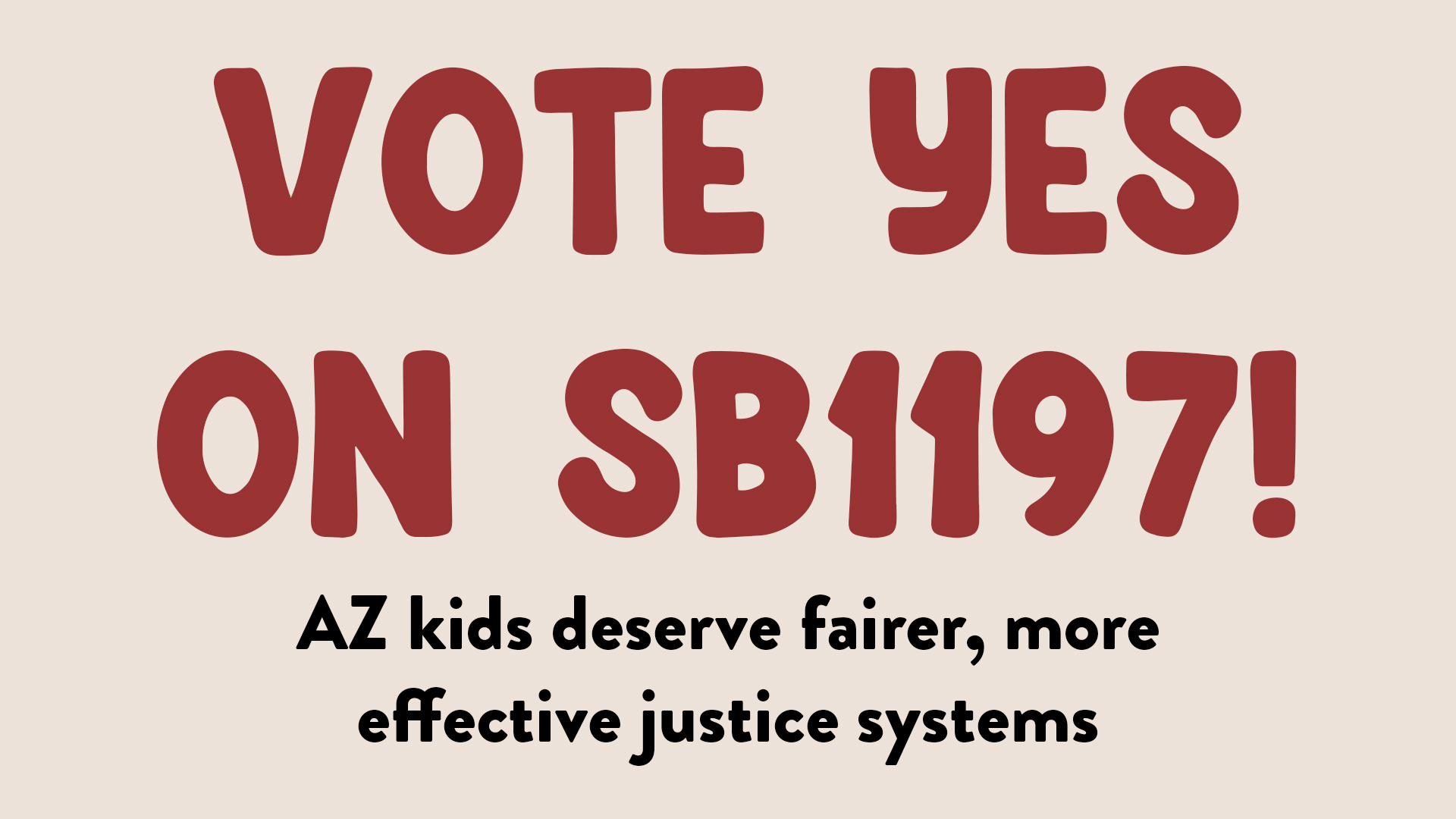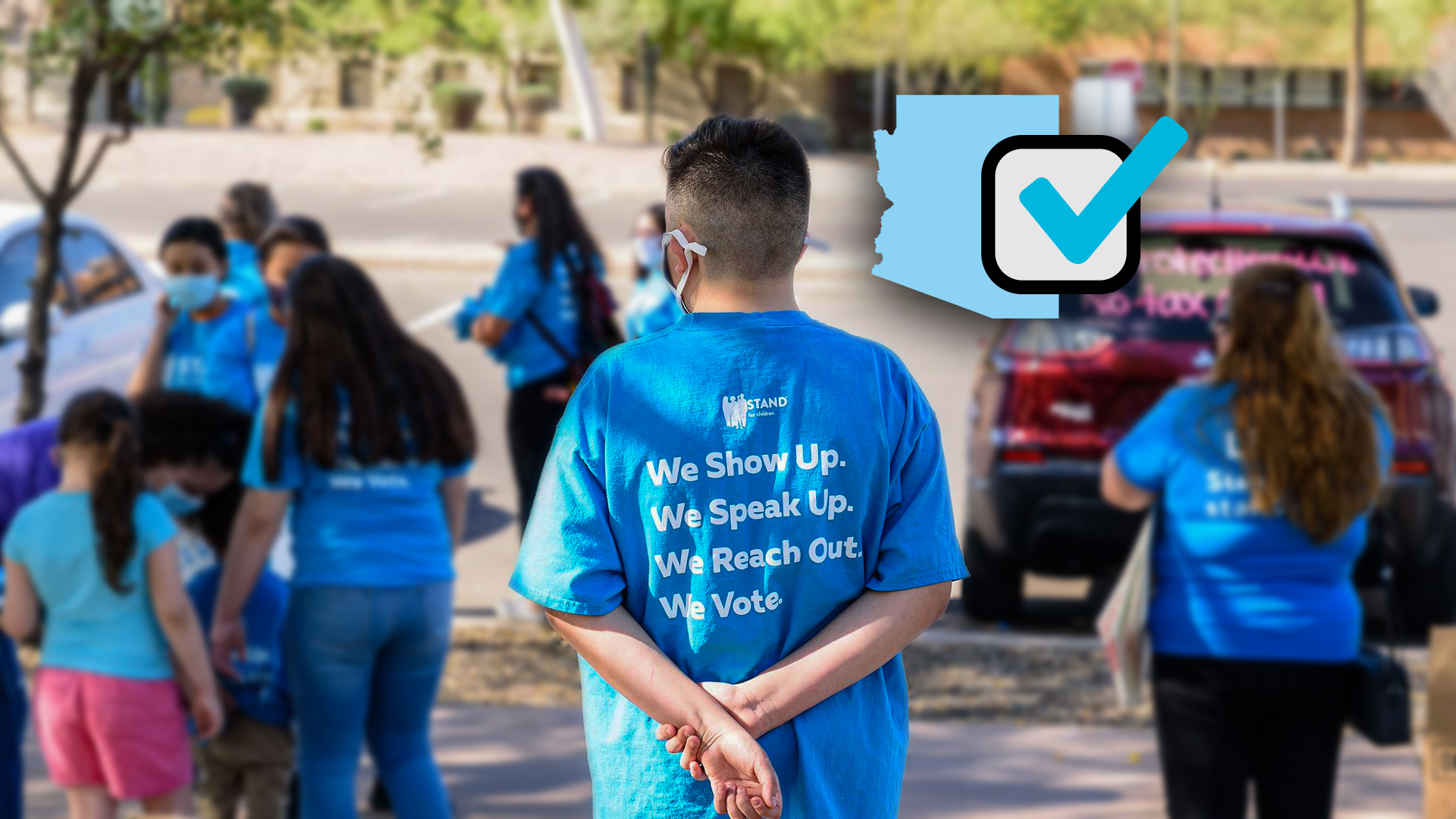
Category: Current Events
NEW POLL SHOWS VOTERS APPROVE OF REFORMING INVESTMENTS IN EDUCATION ACROSS PARTY LINES
A new public opinion poll of Arizona voters reveals a resounding dissatisfaction with the current state of leadership, particularly within the legislature and with Arizona’s Superintendent of Public Instruction, Tom Horne. The data sheds light on key issues facing education in the state and highlights a clear call for reform.
(PHOENIX) – Stand for Children Arizona conducted an annual poll of Arizona voters asking them to weigh in on key issues facing education in the state. The 2023 public opinion survey results reveal that a majority of Arizonans are concerned about the direction of the state and continue to think that there is a great need for additional funds for schools, giving the legislature poor grades when it comes to supporting our students.
State of Concern
Arizonans are dissatisfied with leadership and let down by the support they feel from elected officials when it comes to our children and their education.
- 57% of voters feel that Arizona is on the wrong track. This percentage is unchanged from last year.
- Favorability of Arizona Superintendent of Public Instruction, Tom Horne, has decreased since May, while his name ID has increased.
- 55% of Arizonans have an unfavorable opinion of the Republican-led state legislature.
- When asked to give a grade to the Arizona state legislature when it comes to helping our public schools, 56% of voters said “D/F.”

Demand for School Funding
There is a pressing need for increased public education funding and voters believe that the Arizona state legislature is failing by investing in wealthy corporations over our kids.

- 73% of voters think that there is a need for additional funds for Arizona’s public schools, with a majority believing that need is “great.”
- Even amidst rising costs and inflation, a majority of Arizonans believe that funding for public schools should increase.
- Arizona voters overwhelmingly believe that to address the projected $400 million budget shortfall, the state legislature should stop giving out tax breaks to large corporations and the wealthy instead of taking funds from schools.
- 62% of Arizonans, an increase of 8% over last year, would vote yes on a ballot measure to reform the expenditure limit on education to more adequately fund public schools.
Calls to Reform ESA Vouchers
Arizona’s Empowerment Scholarship Account (ESA) voucher program is failing our most vulnerable students and a majority of voters are calling for drastic changes.
- After hearing about the lack of safety measures, such as background checks for teachers, use on non-educational expenses, and lack of accreditation or transparency, a majority of Arizona voters oppose the ESA voucher program.
- 65% of Arizonans would vote yes on a ballot measure to reform the ESA voucher system by increasing oversight, financial transparency and accountability, and limiting the program to students in need.
Investing in our Children’s Futures
Across party lines, Arizonans are in support of investing in our state’s future through programs that directly impact our youngest learners.

- 73% of voters support establishing state funding for all-day Kindergarten in all Arizona public school districts and charters. 71% support the same establishment for pre-Kindergarten.
- 60% of voters support a permanent annual $350 per child tax rebate.
Connecting Families in Arizona’s Justice System
Prison telecom corporations charge families with incarcerated loved ones up to a dollar per minute for a phone call. Preying on families, these companies take in $1.4 billion annually and pay hundreds of millions in kickbacks to correctional agencies. As a result, 1-in-3 families with someone incarcerated falls into debt trying to stay connected.
- A majority, 58% of voters, support a proposal to make telephone communications between people inside and outside of prisons and jails free in Arizona.
Rebecca Gau, executive director of Stand for Children Arizona says about the poll results, “voters are clearly unhappy with how the legislature and Superintendent of Public Instruction Tom Horne have approached education and the state budget. From ESA vouchers to school funding, I am hopeful that state leaders will address the needs of kids and families and put kids before politics.”
The survey was conducted November 13-20, 2023, by Tulchin Research. Poll results are attached.
Click here to view detailed polling results.
4 ways Arizona schools chief Tom Horne is wrong about dual language learning
Originally published by azcentral. “Tom Horne Attacks Lessons for English Learners without Knowing the Law.” August 26, 2023.
Our local public schools in Arizona remain under attack. While the legislature voted to pass a one-year waiver to address the aggregate expenditure limit (AEL) for this year, avoiding a financial crisis that would have forced Arizona schools to cut $1.3 billion dollars, there is currently no commitment in place to ensure this issue doesn’t come back next year.
What is the Aggregate Expenditure Limit (AEL)?
The Arizona Public Schools Aggregate Expenditure Limit (AEL) is a state law that limits the amount of money that public schools in Arizona can spend each year. It was passed in 1980 to set a spending cap for all public schools based on attendance and inflation (it excludes charter schools since they didn’t exist in 1980). The AEL is an antiquated measure that does not account for modern day school finance or the ways education has changed since 1980. The AEL is calculated each year by taking the average per-pupil spending for the previous three years, and then adjusting it for inflation and student enrollment. The AEL is then used to determine the maximum amount of money that each school district can spend in the following year – regardless of how much the state legislature and the Governor have budgeted for schools.
How does it impact our schools?
This year alone, schools across the state would have lost $1.3 billion, if not for the legislature passing a waiver. This will mean that next year, we can estimate schools will be in danger of losing a similar amount of money. Meaning, our local schools would be forced to:
- Close schools
- Fire teachers (worsening an already existing teacher shortage)
- Fire of support staff
- Cancel after school programs
- Shorten the school day
To see how much the AEL would cost YOUR district if not overturned, check out this list of impacted districts.
Didn’t the state increase education
funding last year? Why is this an issue?
In 2022, the Arizona state legislature passed a bipartisan budget which included historical investments in education. We were on the front lines to get this $1 billion investment added.
Education stakeholders were promised by the governor and legislators that the AEL would be fixed to allow these funds to actually be spent by schools.
Ultimately, Governor Ducey did not follow through on his commitment, and now schools are being forced to annually plan contingencies based on political theatre. We need our elected officials to put kids ahead of politics and do the right thing.
What can we do?
Legislators have until June 30th to place a waiver for the AEL for the upcoming school year.
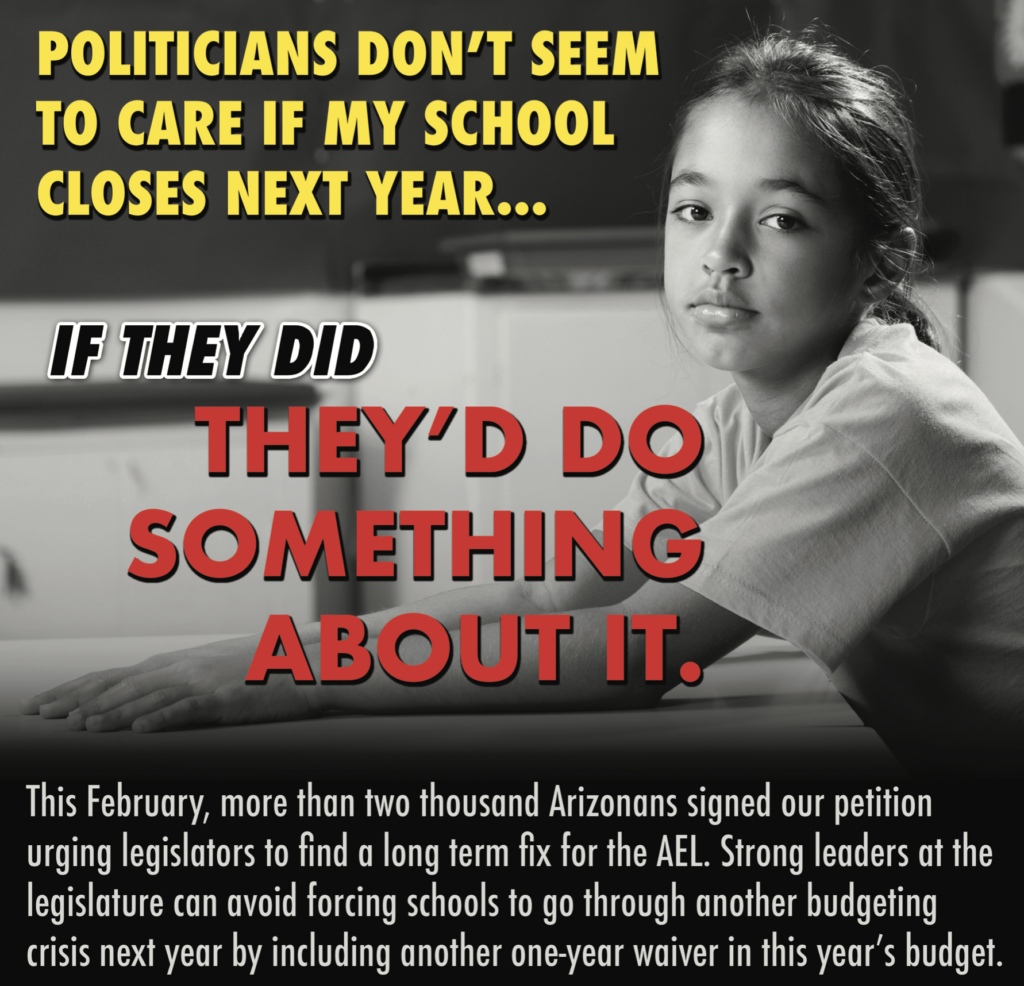
In recent years, administrative juvenile court fees have become a source of major financial burden for many Arizona families. These fees are charged to youth at every stage of their involvement in the juvenile justice system and add up quickly. The challenge to keep up with payments is an unreasonable obstacle for lower income Arizonans and strips opportunities from kids. Luckily, a bill is currently making its way through the Arizona state legislature that could change all of this.
What are these fees?
When a kid gets in trouble with the law, Arizona courts charge a variety of fees. Families are expected to pay administrative fees for diversion, legal representation, detention, probation, counseling, medical care, and payment plans. Note: these fees are explicitly separate and distinct from punitive fines and victim restitution, and Stand for Children Arizona (as well as most Arizonans, according to our 2022 survey) support elimination of administrative fees only, while keeping costs associated with fair justice.
A family can expect to pay thousands in court-ordered fees, which is almost a month’s income for a single-parent household earning full-time minimum wage:

HARMING ARIZONA KIDS
Systematically, our justice system hurts Arizonan children of color, and the presence of administrative fees makes it even harder. In Arizona, the most represented demographic of detained youth is Latino/a. Overall, they are more likely to be sentenced to intensive probation, as well. Black youth are nearly 4x as likely to be referred to juvenile court, and Indigenous youth are 2x more likely to be referred to juvenile court, and 2.5x more likely to be sentenced to intensive probation.
These administrative juvenile court fees are a barrier to young people’s success. Proper restitution and rehabilitation is a necessary component of an effective and fair justice system, but these fees are unreasonable and can compound into worse issues as the child grows up. If an affected kid is unable to pay their fees before they turn 18, those fees follow the child as a civil judgement and make it really hard to get an apartment or even a job.
HOW WE CAN ELIMINATE THESE FEES
SB1197 is a bill that seeks to eliminate administrative juvenile court fees. If passed, it will help kids around the state who just want to learn from their mistakes and move on, and it will take immense burden off of the shoulders of many parents and caretakers. If we want a fairer and more effective justice system for our kids, we need to come together and support this bill and inform our communities about this important issue.
The Arizona State Senate MAPS committee will vote on this bill on February 8th:
STEP ONE – Call your legislators (1 senator, 2 representatives) and ask them to support SB1197. Use this to determine your legislative district and then use this to find their phone number.
STEP TWO – Tell your friends! The more people are aware about this issue the greater chance we have to eliminate these fees and bring relief and opportunities to Arizona’s youth.
STEP THREE – Share your story. Often, for bills like this, real stories of people affected by the systemic failure can sway legislators the most. That’s why we are looking to uplift and support Arizonans affected by these burdensome fees. Together, we can make a major impact.

Our local public schools in Arizona are under attack once again. Currently, the legislature has not voted to pass a one-year waiver to address the aggregate expenditure limit (AEL), and as a result, schools will be forced to cut $1.3 billion dollars on March 1st
What is the Aggregate Expenditure Limit (AEL)?
The Arizona Public Schools Aggregate Expenditure Limit (AEL) is a state law that limits the amount of money that public schools in Arizona can spend each year. It was passed in 1980 to set a spending cap for all public schools based on attendance and inflation (it excludes charter schools since they didn’t exist in 1980). The AEL is an antiquated measure that does not account for modern day school finance or the ways education has changed since 1980. The AEL is calculated each year by taking the average per-pupil spending for the previous three years, and then adjusting it for inflation and student enrollment. The AEL is then used to determine the maximum amount of money that each school district can spend in the following year – regardless of how much the state legislature and the Governor have budgeted for schools.
How does it impact our schools?
This year alone, schools across the state will lose $1.3 billion. This will mean that after March 1 districts may have to
- Close schools
- Fire teachers (worsening an already existing teacher shortage)
- Fire of support staff
- Cancel after school programs
- Shorten the school day
To see how much the AEL will cost YOUR district if not overturned, check out this list of impacted districts.
Didn’t the state increase education
funding last year? Why is this an issue?
Last year, the Arizona state legislature passed a bipartisan budget which included historical investments in education. We were on the front lines to get this $1 billion investment added.
Education stakeholders were promised by the governor and legislators that the AEL would be fixed to allow these funds to actually be spent by schools.
Ultimately, Governor Ducey did not follow through on his commitment, and now schools are being forced to plan contingencies based on political theatre. We need our elected officials to put kids ahead of politics and do the right thing.
What can we do?
We have until March 1st to pressure our elected officials to lift the AEL for this year. Here’s what to do to help:
STEP ONE – Sign our petition asking the legislature to lift the AEL. We are delivering collected signatures for an in-person “Lift with Love” event on February 14 (Valentine’s Day) at the Arizona state capitol. We’ll be handing out valentines (the petition) to lawmakers and asking that they use their heart and think of the kids who will be affected by this archaic policy.
STEP TWO – Call your legislators (1 senator, 2 representatives) and ask them to lift the AEL immediately. Use this to determine your legislative district and then use this to find their phone number.
STEP THREE – Tell your friends! According to our 2022 annual survey, most Arizonans support lifting the AEL. The more people are aware they need to contact their legislators about this issue, the more likely it is we’ll have impact. Share this blog, share the petition, and tell everyone you know that we have until March 1 to support our local schools!
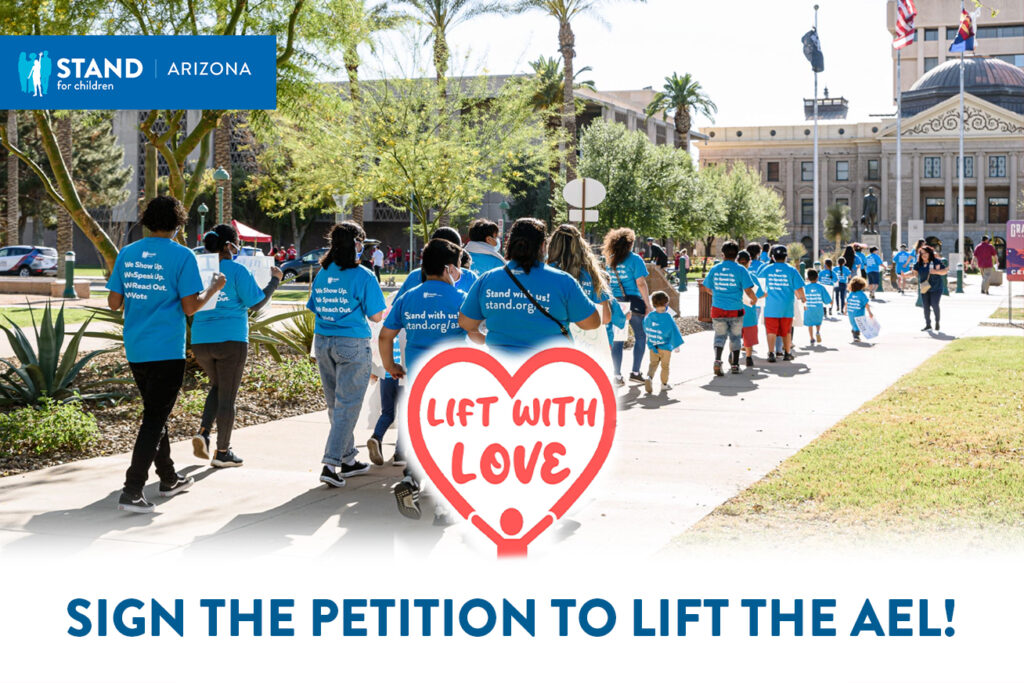
Stand for Children Arizona applauds Governor Hobbs for her strong display of leadership in her first State of the State address. Her call for bipartisanship to tackle key issues signals a unique landscape for our students and schools. It is evident, more than ever, that Arizonans need their leaders to act, and Governor Hobbs has made her message clear: if we are to make progress, we need to work together.
Heading into this legislative session, schools are struggling with burdensome policies such as the Aggregate Expenditure Limit (AEL) blocking schools from critical funding that was allocated in last year’s state budget, and the extreme budgetary consequences from the unaccountable ESA voucher program from previous Governor Doug Ducey’s administration. The current cost is well over $300 million – much higher than advertised during the budget process last year.
In her speech, Governor Hobbs appropriately called on the legislature to act quickly to address the AEL. As one of the organizations that led the charge to increase school funding last session, Stand for Children Arizona couldn’t agree more that legislators have an obligation to honor the promise made to fix the AEL as soon as possible – both for this year, and in the long term.
It is estimated that if the AEL is not waived this year, districts will be forced to cut 17% of their budget, a total of $1.3 billion taken from our local schools. This could result in shortened school years, a deeper teacher shortage, and decaying buildings and infrastructure.
In Stand for Children Arizona’s annual poll, voters indicated they want the AEL fixed immediately as well.
The December 2022 results showed that:
- When asked if there were to be a statewide ballot measure that would permanently raise the expenditure limit, 62% of Arizonans said they would vote “Yes” on it.
- When asked the same question, but for a ballot measure that would remove the limit altogether, 54% said they would vote “Yes”.
Also, according to our survey, the legislature heads into 2023 with 54% of voters unhappy with their performance – the highest it has ever been in our survey’s history. We hope that legislators will put kids before politics, and work together with Governor Hobbs to support our students and teachers.
Every year, Stand for Children Arizona, conducts a poll of Arizona voters asking them to weigh in on key issues facing education in the state. Our 2022 public opinion survey results reveal that the majority of Arizonans feel failed leadership in the legislature has negatively impacted our students and that “lack of adequate funding” is the biggest issue facing our schools.
Arizonans are unhappy with failed leadership and think schools need more funding, prompting many to support a fix for the AEL
- 57% of voters feel Arizona as a whole is on the wrong track, a 5% increase from Dec. 2021 and the worst sentiment since these polls began in 2019.
- When asked to evaluate how well the legislature is serving schools, 57% of voters gave a “D” or Failing grade, the worst result since that question was first asked in 2020.
- Voters feel “lack of adequate funding” is the biggest problem facing our schools – 19% chose it as the highest-ranking issue.
- When asked how much of a need there is for additional funding for Arizona’s public schools, 69% still feel there is “Great” or “Some” need – with over 51% saying there is “Great” need.
Not only do Arizonans feel dissatisfied with leadership, Arizonans are feeling let down by their own schools. When asked to evaluate Arizona’s public schools in grades K through 12:
- 44% of voters gave Arizona public schools a “D” or Failing grade
Now, when asked to evaluate schools in voters’ personal communities:
- This year, only 29% of voters gave their own schools an “A” or “B” grade – a full 5% drop since Dec. 2021 and the lowest since we began asking that question over five years ago.
Clearly, parents feel their schools are becoming less effective and less well supported by the legislature.
To fix the issue of state funding for education, many leaders and organizations have pointed to the outdated Aggregate Expenditure Limit (AEL) as a major obstacle to Arizona’s public schools providing a high-quality education that they can be proud of.
In June, the legislature passed and Governor Ducey approved a state budget that substantially increased investment in Arizona public schools. However, the nearly $1 billion allotted to public schools has yet to make it to classrooms due to the archaic spending cap. Stand for Children Arizona asked voters how they felt about dealing with the limit.
The survey suggests a ballot measure to resolve the AEL issue could be successfully passed
- When asked if there were a statewide ballot measure that would permanently raise the expenditure limit, 62% of Arizonans said they would vote “Yes” on it.
- When asked the same question, but for a ballot measure that would remove the limit altogether, 54% said they would vote “Yes.”
The polling then asked voters to respond to statements surrounding the AEL:
- 63% of Arizonans feel that “the state’s current budget process is cumbersome, bureaucratic, and out of touch with what schools really need to provide a high-quality education that we can be proud of” is a strong argument to eliminate the expenditure limit.
- 60% of Arizonans find the fact that “the spending limit creates undue financial stress and burden on our schools” is a strong argument to “raise the spending limit or remove it altogether.”
Arizonans want teachers to be able to teach.
- Voters feel teacher pay is the main reason to increase funding – 21% of voters who expressed schools had “Great” or “Some” need of additional funding said teacher pay was the main reason to increase funding.
They are also sympathetic to teacher’s need for academic freedom:
- 63% of surveyed Arizonans agree that teachers should be assured of academic freedom in setting curriculum without government interference in setting curriculum.
- 57% of voters agree with the statement that Arizona legislators “are trying to tie the hands of teachers by preventing them from teaching important topics that kids need to learn so we don’t repeat the mistakes of our past.”
Arizonans want investment in early learning.
- 68% of voters support establishing state funding for all-day Kindergarten in all Arizona public school districts and charters.
- 65% of voters support establishing state funding for pre-Kindergarten programs in all Arizona public school districts and charters.
Along with questions surrounding school performance and budget concerns, the survey included questions about how voters feel about the “wide array of administrative fees on youth and their families,” offering Arizonans the opportunity to share their thoughts on improving the justice system for our youth.
Arizonans support fairer treatment of kids in juvenile court
- A majority of surveyed Arizonans support a proposal to eliminate court administrative fees associated only with juvenile court – 51% support, 29% oppose, and 20% don’t know. To note: eliminating these administrative fees does not impact civil and criminal penalties or restitution for victims.
There are multiple supported justifications on eliminating these fees:
- 61% of voters feel “reforming the juvenile court system to eliminate burdensome administrative court fees does not mean that convicted offenders will be excused from having to pay civil penalties or restitution to victims” is a strong argument for eliminating all fees associated with juvenile court.
- 60% of Arizonans think a good reason to remove the financial burden of juvenile court fees on our youth is that “ultimately, a well-functioning juvenile court system will reduce the likelihood of those youth ending up in our state prisons in the future”.
As we turn the page to 2023, I think many former colleagues of mine can learn a lot from this data. When I served in the legislature, the findings of a survey like this were incredibly important. Now, I’m eager to apply this same insight into the work we are doing here at Stand for Children Arizona!
Clearly, Education remains a major focus for Arizonans, and voters support the Aggregate Expenditure Limit getting removed or, at the very least, raised. Also, it is relevant to point out that the legislature heads into 2023 with 54% of voters unhappy with their performance – the highest it has ever been in all of the years Stand for Children has surveyed the public. I’d hope that reasonable leaders will respond to the needs of Arizona and work together with our new Governor to support our students and teachers.
Click here to view detailed polling results.
This year more than ever, your vote will make the difference on critical issues for Arizona’s students.
VOTER GUIDE
The majority of state legislators continue to play games with education funding – balking at the promised restoration of $1 billion for schools, and expanding state funding for private and religious schools to ALL private and religious school students. The current leadership has failed Arizona’s students, but we can change that by voting for candidates who have a proven track record of fighting for school funding that supports ALL Arizona students.
Early voting starts October 12!
OCTOBER 11: Last Day to Register to Vote in Arizona
Check your registration status now
FEDERAL ELECTIONS
U.S. Senate
VOTE for Mark KELLY
STATE ELECTIONS
Governor
VOTE for Katie HOBBS
Secretary of State
VOTE for Adrian FONTES
Attorney General
VOTE for Kris MAYES
Superintendent of Public Instruction
VOTE for Kathy HOFFMAN
https://www.electkathyhoffman.com/
Treasurer
VOTE for Martín QUEZADA
https://www.martinquezada.com/
ARIZONA STATE LEGISLATURE
Although there are other important races for Congressional seats, Supreme Court Justices, etc., the Arizona State Legislature is one of the most important levers we have to support strong schools and a strong economy. No matter what local legislative district you live in (click HERE to find out) our list of Stand-endorsed, pro-education candidates highlights leaders that will support strong schools and a strong economy in Arizona.
VOTE for Judy SCHWIEBERT for State House
VOTE for Jeanne CASTEEN for State Senate
VOTE for Christine MARSH for State Senate
VOTE for Laura TERECH for State House
LD 5
VOTE for Lela ALSTON for State Senate
VOTE for Jennifer LONGDON for State House
LD 6
VOTE for Myron TSOSIE for State House
LD 7
VOTE for Kyle NITSCHKE for State Senate
LD 8
VOTE for Melody HERNANDEZ for State House
VOTE for Eva BURCH for State Senate
VOTE for Lorena AUSTIN for State House
VOTE for Seth BLATTMAN for State House
LD 11
VOTE for Marcelino QUIÑONEZ for State House
VOTE for Oscar De Los SANTOS for State House
LD 12
VOTE for Mitzi EPSTEIN for State Senate
VOTE for Stacey TRAVERS for State House
LD 13
VOTE for Cindy HANS for State Senate
VOTE for Jennifer PAWLIK for State House
LD 14
VOTE for Brandy REESE for State House
VOTE for Taylor KERBY for State Senate
VOTE for Keith SEAMAN for State House
VOTE for Mike NICKERSON for State Senate
VOTE for Dana ALLMOND for State House
VOTE for Brian RADFORD for State House
LD 18
VOTE for Nancy GUTIERREZ for State House
VOTE for Chris MATHIS for State House
LD 19
VOTE for Sanda CLARK for State House
LD 20
VOTE for Sally GONZALES for State Senate
VOTE for Andres CANO for State House
VOTE for Alma HERNANDEZ for State House
LD 21
VOTE for Rosanna GABALDON for State Senate
VOTE for Consuelo HERNANDEZ for State House
VOTE for Dr. Eva DIAZ for State Senate (WRITE-IN)
VOTE for Lupe Contreras CHAVIRA for State House
LD 23
VOTE for Brian FERNANDEZ for State Senate
LD 24
VOTE for Anna HERNANDEZ for State Senate
VOTE for Analise ORTIZE for State House
VOTE for Lydia HERNANDEZ for State House
VOTE for Brittani BARRAZA for State Senate
LD 29
VOTE for Scott PODEYN for State House
BALLOT MEASURES
Arizona’s state legislature voted to send key issues to the voters this year – most of which limit voter access to ballots by restricting the citizens’ initiative process, increasing the hoops voters have to jump through in order to vote, etc. One measure, however, would remove a heinous restriction on some Arizona high school students – known as Dreamers – preventing them from accessing in-state tuition at Arizona’s public colleges and universities. We urge you to vote YES on Prop 308, and NO on those that limit your ability to vote in Arizona.
Prop 128 – limits voter rights – Vote NO
Prop 129 – limits voter rights – Vote NO
Prop 132 – limits voter rights – Vote NO
Prop 308 – in-state college tuition for ALL Arizona HS students – Vote YES
Prop 309 – limits voter rights and restricts mail in voting – Vote NO
You can read more about these, and other ballot measures here.
SCHOOL BOARD CANDIDATES
In addition to these major races, we urge parents to stay engaged within their own local public school district. In these races, you have the opportunity to elect true education champions that will most directly affect the quality of education your child receives. Our friends at Save Our Schools have shared a strong roster of candidates with us – check it out now HERE!
Extremist politicians are close to taking over our state – putting quality education, reproductive rights, and democracy in danger. This election counts, PLEASE join us! We need responsible leaders to strengthen schools, support our families, and put Arizona back on track. Please sign the pledge to vote this fall! Early mail-in voting starts October 12, 2022. Election day is November 8, 2022.
See you at the polls! PLEDGE TO VOTE NOW
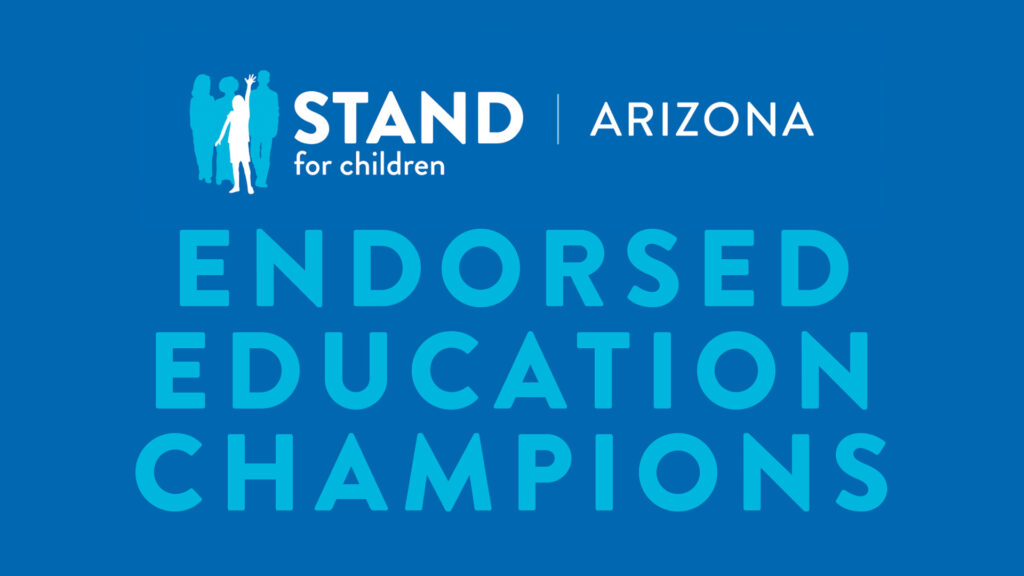
Since our founding in 2009, Stand Arizona has been a leading advocate for proven policies,
along with the funding necessary, to ensure all students have access to a high-quality
education. For the past four years, we have co-led the Invest in Education Coalition, which
developed and passed Proposition 208 to help address our state’s chronic public school teacher
shortage, improve our state’s worst in the nation counselor to student ratios, and increase our
state’s low graduation rates.
This bipartisan education budget will help Arizona public schools address these key challenges
in order to increase student achievement and improve education outcomes across the state,
ensure Arizona students are better prepared for life beyond the classroom, and that our
Arizona businesses have the skilled workforce necessary to remain competitive.
The budget includes substantial increases in base funding and significant new formula weights
to help Arizona schools mitigate the impacts of poverty on student achievement and make
significant strides in catching up to the costs of additional learning support provided through
special education. Additional one-time monies will help schools address delayed capital
projects, replace transportation fleets, and upgrade technology.
Throughout the budget process, Stand Arizona worked closely with school-based leaders,
legislators, and education groups across the state. We would especially like to thank the school
district superintendents who came together to create and persistently champion a budget that
will boost student success in every corner of our great state.
As we await Governor Ducey’s signature, we would like to express our appreciation for the
legislature’s support and commitment to public schools demonstrated through the FY23
budget, with particular thanks to those legislators on both sides of the aisle who worked
tirelessly and insistently for a comprehensive package that would advance public schools
statewide.
For the better part of twenty years, major funding for education in Arizona has been secured
through the ballot box and the courts, not the legislature. It is particularly noteworthy that in
honoring the will of the voters expressed in 2020 with the passage of Proposition 208, the
legislature has acted on a bipartisan basis to meaningfully invest in public education.
PARENTS HAVE POWER!
A great example of people using their power to influence change in their community happened in Alhambra School District in February. Stand helped Alhambra parents partner with their superintendent to engage in listening sessions to share their concerns about what was happening in their community.
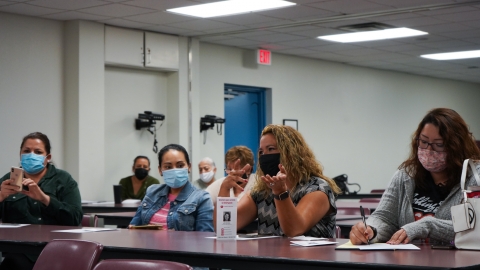
In the listening sessions, parents shared that the issues keeping kids from focusing in school are external to school – things like homelessness, drugs, prostitution, and robbery. On their way to school, kids are seeing people sleeping on the street and walking past discarded needles on the ground. One Stand mom, Luisa, said her kids were scared. They were worrying about the walk home at the end of the day instead of focusing on what was happening in class.
These conversations led to a proposal before the Phoenix city council last month, Act 49, which successfully passed 7-1, investing $4.1M into community safety measures. Over 50 Stand parents showed up at the council meeting and three Stand leaders testified, sharing their stories and why these changes were needed.
And the city listened.
The Phoenix streets where kids walk to school will be safer with more streetlights, cameras, and other safety measures thanks to a successful partnership between Stand parents and the City of Phoenix. We couldn’t be more grateful to both!
This piece was published on the Arizona Republic on March 21st, 2022.
Changing the Arizona Constitution is the wrong way to address critical race theory
Opinion: It’s a bad idea to add voter-protected language to the constitution that could have major unintended consequences for Arizona schools.
A bill that has largely gone unnoticed until this week seeks to put the controversy over the teaching of critical race theory to a vote by Arizonans.
Regardless how one views CRT, the proposed constitutional amendment by Arizona legislators is a flawed plan that should be abandoned.
House Concurrent Resolution 2001 – on the agenda Tuesday before the Senate Education Committee – would refer a constitutional amendment to the ballot for the Nov. 8 election, making it voter-protected and placing a host of prohibitions and restrictions on what schools, colleges and universities can do.
HCR 2001 is legislative overreach

HCR 2001 would ban students, teachers, employees or even job applicants from “making a statement of personal belief in support of … Diversity, Equity, and Inclusion” beyond the U.S. 14th Amendment and prevent state agencies from implementing federal programs that do anything beyond the express language of the 14th Amendment.
For example, if a federal education program required disaggregated data collection, the state would likely not be able to do it.
The legislation would also prevent schools from discussing equity policies that have arisen despite the 14th Amendment – essentially restricting any discussion of race and ethnicity to only what the amendment says. It leaves punishment for any violations to be prescribed by the Legislature.
Whether or not one believes prohibiting conversations about diversity, equity and inclusion in schools is either wise or necessary, there are practical matters that make this the wrong way to go at the issue.
Hasty changes in the 2000s still plague us
First, adding this kind of language to the state constitution is a bad idea. If passed, it could only be amended at the ballot – making it extremely challenging to undo or amend. Lest we forget, constitutional and voter-protected statutory changes made hastily in an anti-immigrant fervor in the early 2000s still plague us – “English Only” in classrooms, prohibitions on in-state tuition for DACA students come to mind.
It is also unwise to add to the constitution voter-protected language that could have problematic unintended consequences for instruction in Arizona.

The College Board announced earlier this month in a statement of principles that high schools that ban “required topics” in their Advanced Placement classes could lose AP designations. Though it is unclear exactly how this might play out, many parents choose their child’s school based on AP course availability.
In addition, AP courses are a key component on which schools are evaluated (for example, by U.S. New and World Report). Other states are going down this path now – we should see how it plays out before placing language in our constitution that will be nearly impossible to remove. It’s just not worth the risk.

Don’t like policies? Give local control a chance
Second, it creates a chilling effect on free speech. This rhetoric is coming from the same people who protested the idea of “politically correct” speech on the grounds that speech could not and should not be curtailed just because it makes some people feel threatened or uncomfortable. This point was recently made by Justice Samuel Alito, one of the most conservative members of the Supreme Court, in this opinion.
Third, it violates local control and parent choice. Arizona parents benefit from “open enrollment” policies that many other states don’t have. They can choose a school, district or charter, in any location for free.

At the same time, local school board members are elected officials, tasked with the fiscal responsibility and accountability to their local community. If parents don’t like any choice the school board makes, they can “vote with their feet” and leave the district (or charter), or they can “vote the bums out” in the next election.
Attempting to dramatically influence very locally derived hiring policies and curricular decisions is legislative overreach.
Placing language in the Arizona Constitution makes it virtually impossible to adjust or improve, regardless because it goes too far or doesn’t go far enough. That’s just bad policy, especially when the unintended consequences could harm Arizona’s families.
Rebecca Gau is executive director of Stand for Children Arizona
Arizonans are fed up with failed leadership at the state capitol.
The battle for more funding and investment into schools is putting the actions of state leaders at odds with the demands of voters. Time after time, voters have expressed their disapproval in public opinion polls and organized efforts to secure much needed funding for teachers and students.
Last year, 1.7 million Arizona voters passed Prop 208 – a historic initiative that would raise nearly a billion dollars annually in K-12 education funding to help address the state’s longstanding teacher shortage crisis, lower class sizes, hire aides and counselors, and expand career and technical education.
Over the last year and a half, legislative leaders and Governor Ducey were determined to kill Prop 208 and deny voters what they have been asking for over a decade: more investment in education.
Today, Arizona stands as the state where teacher pay is among the lowest in the nation, class size is the highest in the nation, and the student to counselor ratio is the worst in the nation, with an average of 900 students for every counselor.
This week, Stand for Children Arizona released our 2021 Annual Poll. This has been an annual survey to gage the support from voters on important issues like education and leadership. This poll is also significant because it delivers five years of data on some questions.
The new public opinion survey reveals that a majority of Arizonans believe the state is headed in the wrong direction and have continued their low approval ratings for the Governor and the legislature from last year.


Voters are not happy with the direction of the state, or state policymakers
- 52% of voters believe things in Arizona are on the wrong track. This has held steady from last year and is up 20% since 2019. Similarly, only 33% of voters believe the state is on the right track, down from its highest point of 50% in 2018. Going even further back, in 2016 48% believed the state was heading in the right direction and only 34% believed the state was on the wrong track. (Slide 4)
- 52% of voters have a total unfavorable impression of Gov Ducey, with 33% saying “very unfavorable.” (Slide 5)
- 50% of voters have an unfavorable view of the AZ legislature, up from 48% last year (Slide 5)
- Arizona voters give Gov Ducey a failing grade when it comes to helping Arizona’s public schools, 43% give him a “D or Fail”. This is way up from 31% in 2019. (Slide 7)
- Arizona voters give the legislature a failing grade when it comes to helping Arizona’s public schools, 47% give a “D or Fail”. This is up from 41% in 2019. (Slide 8)


At the same time voters give these sinking favorability ratings, they intend to hold policymakers accountable for key policy decisions affecting education funding.
- 46% of voters say they would be less likely to vote for a candidate for state office who was part or supported the efforts to overturn Prop 208 – Invest in ED. (Slide 11)
- In order to stop the citizen referral Prop 307, legislators are considering a legislative gimmick known as “repeal and replace” that would basically block voters from voting on the referral, ensuring the tax cut for the wealthy stays in place. 55% of voters say that they would be less likely to vote for a candidate for state office who was part of or supported efforts by the legislature to “repeal and replace.”

Voters continue to strongly support education funding.
- 71% of Arizona voters believe there is a need for additional funds for public schools, with 48% saying that there is a “great need.” This overwhelming support has held steady since last year. Only 24% say there is not much need.
- 67% of voters believe the state spending cap on education funding needs to be addressed. 37% of voters say they support increasing the spending limit on education, while 30% say they would support permanently removing the spending limit on education. This includes 76% of rural voters supporting an increase/removal on the spending limit and 52% of Republican voters supporting the increase/removal of the spending limit on education.
- 60% of voters say that “Politicians shouldn’t be allowed to overturn voter-approved education funding just because they don’t like the results of the election,” is a convincing reason to oppose efforts to “repeal and replace” SB 1828 – the tax giveaway for the wealthy.
- 61% of voters say that “The fate of Prop 208 should be decided by the 1.7 million voters who passed it, not 48 politicians in Phoenix,” is a convincing reason to oppose efforts to “repeal and replace” SB 1828 – the tax giveaway for the wealthy.
Politicians who oppose increased education funding are in jeopardy. Voters are watching their elected officials and strongly dislike candidates that oppose education funding.
- 59% of voters find that “Legislators must be held accountable in next November’s election for undermining the will of the voters,” is a convincing reason to oppose efforts to “repeal and replace” SB 1828 – the tax giveaway for the wealthy.
- 61% of voters say that “The Legislature shouldn’t try any dishonest gimmicks to push through their tax cut for the wealthy – they should let the voters decide in November” is a convincing reason to oppose efforts to “repeal and replace” SB 1828 – the tax giveaway for the wealthy.

The survey was conducted in December 2021, by Moore Information Group. You can see the full results on our website.
Voters want politicians to fulfil their commitment to students and teachers.
Arizonans have spoken and will not give in to any attempts to cut funding to our schools. In fact, voters feel quite the opposite. We invite you to join us in our effort to restore funding to our schools and keep state leaders accountable.
Good leadership means looking out for working families.
We commend our nation’s leaders who, through the Build Back Better Framework, have set the path forward to providing families nationwide the resources they need to succeed.
Right now, the choice to continue investing in Arizona families is in our elected official’s hands.
When the American Rescue Plan was passed, it put money directly into families’ pockets with the expansion of the Child Tax Credit. For many working families, the Child Tax Credit expansion has been a godsend.Unfortunately, as of now, the expanded Child Tax Credit is set to expire – leaving our communities in dire circumstances. We need the Child Tax Credit to be extended and made permanent.
Over the past year, our team at Stand AZ has connected with families to hear about their needs. We’ve heard from thousands of hard-working parents whose lives have been changed by receiving the monthly Child Tax Credit payments.
This sweeping effort has cut child poverty by 45 percent. The payments have provided more than 35 million Americans with food security, the ability to afford rent, and the funds needed to take care of the basic needs of their children.
While a one-year extension provides only temporary relief, we know it’s a first step in changing the futures of an entire generation of children. For Miguel Gaytan, a father in Phoenix, the Child Tax Credit is a crucial need for his family.
“The child tax credit money has helped my family in so many ways, I’ve been able to catch a break and pay past due bills that have set my family behind. My wife had lost her job during COVID so this money has truly been a lifesaver. I know there are so many other families out there like mine who are still struggling to pay off debts and trying to keep their family afloat, this pandemic is not over and this extra bit of help goes a long way. I hope the government makes this a permanent program so that families can continue to feel supported.”
Extending the CTC is extraordinarily vital for low and middle-income families. For working mom, Kattya Valdez and her daughter, Isabella, this is very much the case. Like many families since the beginning of the Covid-19 pandemic, life has been a struggle. Also like many families, the expansion of the CTC has helped ease that burden. As Katya says,
“I am very grateful to have a job, but as a single parent, it is sometimes difficult to make ends meet month to month. The Child Tax Credit money has been extremely helpful in paying for my daughter’s tutoring and catching up on my monthly bills.”
You can learn more about the CTC at childtaxcredit.gov.
Along with thousands of our supporters from Arizona and around the country, we call upon members of both houses of Congress to support the legislation that will be built upon the Build Back Better framework and forever be a part of a historic investment in our nation’s future.
This piece was published on the Arizona Capitol Times on August 26th, 2021
Right now, Arizona is experiencing a child care crisis. Costs and demand for high-quality child care are on the rise in Arizona. Now, with the pandemic forcing one-third of the state’s licensed child care providers to close, parents are left with nowhere to turn while workers lose their livelihoods. As parents, advocates for children, and policy experts, we know first-hand how critical quality child care is for our children, families, and local economies.

Kelley Murphy
To fully address our state’s child care crisis, the Senate must support President Biden’s Build Back Better Agenda, which guarantees access to high-quality, affordable child care for low- and middle-income families and provides universal free preschool to all 3- and 4-year-old children. This historic investment will set our children up for success throughout their lives and strengthen our communities. Investing in child care will boost our local and national economies. A recent study has found that the nation’s child care crisis costs the country $57 billion a year in lost earnings, productivity and revenue. Expanding access to affordable child care and supporting the Build Back Better agenda will give 29,532 more Arizona parents the option to work and will generate $3 billion of new economic activity in our state. This plan will also support child care providers and ensure that child care workers are paid a living wage of at least $15 an hour. Beyond being the right decision for our children and working families, investing in child care is the right choice for our economy.
Quality child care is critical to a child’s development and long-term success. Children enrolled in quality early care and education programs build early literacy skills, and develop basic social, emotional, and problem-solving skills that prepare them for formal schooling. Studies have shown that children who participate in quality early care and education programs are more likely to graduate from high school, obtain a job, and make a higher income than peers who do not. Providing access to quality early care and education can also reduce racial and income gaps in academic outcomes and performance. By investing in universal free preschool and expanding access to quality child care, the Build Back Better agenda will ensure that Arizona’s children are on a path to success from the start.

Rebecca Gau
Arizona families are struggling to keep up with the rising cost of child care. Right now, the annual cost of infant care for one child eats up 19.8% of a median family’s income in Arizona. At $10,948 a year, infant care in Arizona is now more expensive than tuition for public college. Arizonans can’t keep up with these skyrocketing costs, which is why Congress needs to put money back into the hands of working families and invest in affordable child care. By covering the cost of quality child care for low-income families and ensuring that middle-income families pay no more than 7% of their income toward child care, the Build Back Better agenda will save average Arizona families thousands of dollars.
Arizona can’t let the child care crisis go on any longer. We need Congress to support our communities and invest in our children, families, and child care providers. We urge Sens. Kyrsten Sinema and Mark Kelly to support the Build Back Better agenda and deliver the child care and early learning investments Arizona needs to strengthen our communities.
Kelley Murphy is vice-president policy, Children’s Action Alliance and Rebecca Gau is executive director, Stand for Children Arizona.












